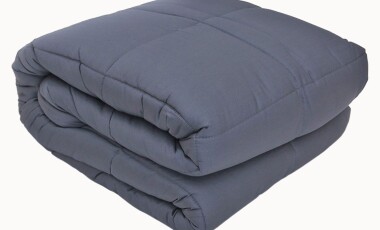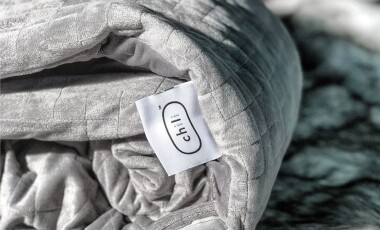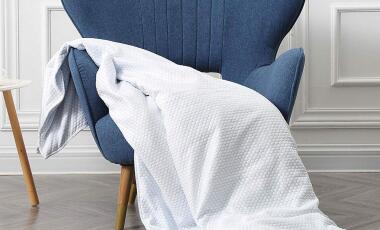We’ve all been there on occasion, tossing and turning when we should be sleeping, overwhelmed by world events, personal issues, work stress, or to-do lists. And for anyone who also experiences anxiety, depression, or conditions causing body aches or agitation, you’ve likely been there often.
Snuggling with someone you love — a partner or a dog — helps sometimes, but, partners have their own tossing, turning, dark nights, while dogs have those dreams that make their legs twitch. In comes an alternative: the weighted blanket.
Weighted blankets are filled with pellets, beads, or chains and can weigh anywhere from 5 to 30 pounds. This heaviness offers sensory input designed to make you feel contained and secure, similar to the calming sensation of being hugged or swaddled by a loved one or pet. You become more aware of where your own body ends, and the world outside begins, which has an organizing and soothing effect. The sensation of being held calms physical and emotional restlessness.
In general, the reassuring pressure of weighted blankets is thought to aid emotional and physical regulation. Research also suggests that weighted blankets help reduce the symptoms of chronic conditions that cause sleeplessness, agitation, or body aches. Though not for babies, children, and people with certain health conditions, weighted blankets are otherwise generally considered a safe option for sounder sleep.
So if you’re considering one for yourself, another adult, or teen, this plush bed addition may be a worthwhile investment in mental and physical wellbeing. Read on to learn more.
The benefits of weighted blankets
1. Offers relaxation and comfort for easier sleep
A weighted blanket offers comfort, which relaxes users as they prepare to fall asleep. Licensed clinical psychologist Shelby Harris, Psy.D., author of “The Women’s Guide to Overcoming Insomnia,” compares weighted blankets to deep pressure stimulation. An overarching benefit, she suggests, might be to “quiet, calm, and relax the nervous system.”
“When somebody is more comfortable, they're probably more likely to sleep a bit better or fall asleep a little bit easier,” observes Dr. W. Chris Winter, Sleep.com Advisor, neurologist and author of “The Rested Child.”
A 2015 study of participants ages 20-66 with insomnia found that objectively they tossed and turned less under weighted blankets, resulting in a calmer night’s sleep. Subjectively, they reported sleeping more peacefully.
2. May reduce insomnia and daytime fatigue
A 2020 randomized, controlled study looked at 120 adults with clinical insomnia (along with bipolar disorder, attention deficit hyperactivity disorder, generalized anxiety disorder, or depression) who used weighted blankets for four weeks. Compared with the control group, those who used the weighted blanket experienced:
- less insomnia
- longer sleep
- higher daytime energy levels and moods
The same study also notes that weighted blankets may also ease the cognitive problems, tiredness, and emotional disturbances.
3. May help children with ADHD and autism to fall sleep
While 2014 study concluded that the pressure of the weighted blanket did not improve the sleep of children with autism, both the participating children and their parents reportedly appreciated the weighted blankets.
Another 2021 study however found that children with ADHD as well as those on the autism spectrum did fall asleep more easily and stay asleep longer when using weighted blankets.
It seems that weighted blankets can be perceived as calming and, for some, be clinically effective in reducing insomnia.
4. May help calm and decrease anxiety
A 2021 study evaluated the consequences of weighted blanket use by 122 in-crisis patients in an inpatient psych ward. Compared to those in the control group, participants using a weighted blanket or lap pad for 20-minute sessions experienced:
- drop in pulse rate
- reduced heart rate
- statistically lowered anxiety
Researchers also concluded that weighted blankets may be a safe alternative to sedation or physical restraints for those experiencing anxiety.
Weighted blankets may also help during stressful events. Among patients having their wisdom teeth pulled, weighted blankets were shown to calm the fight-or-flight reaction. Similarly, a randomized controlled study of cancer patients found that those using medical-grade weighted blankets experienced less anxiety than those who did not.
5. Helps release oxytocin for relaxation
The autonomic nervous system controls digestion, body temperature, and the body’s response to stress. According to Penn Medicine, weighted blankets help to switch this system into “rest mode,” which results in:
- the release of oxytocin, a hormone important for relaxation
- awakening of the autonomic nervous system, lowering feelings of stress
- reducing the sympathetic arousal that drives the “fight or flight” reaction
6. May help ease chronic pain
Winter observes that weighted blankets “can be particularly helpful for people who have restless leg syndrome…If somebody would rather not take medication, then I would suggest they think about a weighted blanket.”
This randomized-controlled trial found that deep pressure may help individuals have a reduced reaction to pain. Of the 94 adult participants, all with chronic pain, those who used a heavier, 15-lb blanket experienced a greater lessening of pain than those who used a 5-lb weighted blanket. The most anxious participants experienced the greatest benefits from the pressure.
The researchers suggested deep pressure helps people organize and calm their reactions to pain and that weighted blankets may be an effective drug-free tool in pain management.
What size weighted blanket should I get?
One of the first things you’ll want to consider when going to buy a weighted blanket is how heavy it should be. Harris recommends that adults aim for a weighted blanket that is about 10 percent of their body weight.
Weighted blanket size chart
| Body Weight | Approximate Blanket Size |
| 50 lbs | 5 lb |
| 80 lbs | 8 lb |
| 100 lbs | 10 lbs |
| 120 lbs | 12 lbs |
| 150 lbs | 15 lbs |
| 180 lbs | 18 lbs |
| 200 lbs | 20 lbs |
| 250 lbs | 25 lbs |
How heavy should my weighted blanket be?
Other individual factors like personal sleep habits and age influence what weight blanket you might want.
If you get up frequently at night, you may want to aim for something lighter. “[A heavier blanket] actually makes it difficult to get up,” Harris says. “I still want patients to get out of bed if they can’t sleep in order to help de-associate the bed with frustration and issues with worrying, stress, and anxiety.”
How to choose your weighted blanket
Besides weight, the size, material, and temperature of the weighted blanket can also affect your sleep.
Size considerations:
- oversized blankets may fall off the bed
- it requires more effort to put an oversized blanket back on the bed
- smaller blankets offer more pressure where you need it.
Materials to choose from:
- microbeads, pellets, or chains should be surrounded by batting so as not to make noise.
- outer covering influences your comfort. Cotton, chenille, or fleece may be soft and pleasing to the touch.
- removable, washable covers are helpful for cleaning and minimizing dust and allergies.
Temperature control:
- bamboo covers wick away moisture and are considered to be cooling.
- other brands of cooling weighted blankets are designed to help with overheating.
- extra-stuffed blankets tend to be warmer
[Note: If you buy something using a link on our site, we may earn a commission.]
Are weighted blankets safe?
Weighted blanket for children
Weighted blankets are not considered safe for home use by babies, as Harris states that “Anyone under age two shouldn’t be using a weighted blanket.” Children who are over the age of three or above 50 pounds may be able to sleep with a blanket weighing between 3 and 12 pounds, depending on body weight, but check with your child’s pediatrician first.
Some doctors don’t recommend weighted blankets for children, especially overnight use, because the child may not be able to easily move the blanket. This could put them at risk for blocked air flow, affected circulation, or affected heart rates.
Weighted blankets for older adults
For older adults, experts recommend erring on the lighter side. A too-heavy blanket can make it difficult to get up to use the restroom or create panic if the person starts to feel trapped.
Weighted blanket for health conditions
Harvard Health recommends that those with the following conditions check with their doctors before using weighted blankets:
- sleep apnea
- respiratory problems
- sleep disorders
Harris adds that a weighted blanket may not be ideal for anyone with the following conditions:
- claustrophobia
- asthma
- breathing issues at night
Physical concerns
You will likely want medical advice about the proper blanket weight if you are:
- easily injured
- recovering from surgery
- prone to pulling a blanket over your head at night
To sleep, perchance to sleep better with a weighted blanket?
For many adults, weighted blankets offer the comfort of being held or swaddled, encouraging more restful sleep and potentially calming the body’s reaction to pain. And is it okay to sleep with a weighted blanket every night? That depends on your experience. For example, if you feel sore in the morning after a night with your weighted blanket, you may want to talk to your doctor and take a break from your blanket. Soreness could be a result of the wrong weight or your body may not just be suited for extended, nightly use.
You could also try shorter naps with the weighted blanket. For anxious afternoons, this (and a cup of soothing tea) may be just what you need to recenter and soothe yourself.
If use is safe for you, an appropriately weighted blanket may be an ideal self-care gift to self this year.















